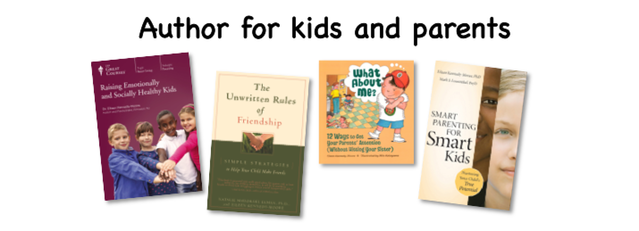Friends
How Children Make Friends (part 3)
Moving from friendly to friendship.
Updated September 30, 2024

A young, elementary school girl once told me, “I know how to make friends!”
“How?” I asked.
“You just go off by yourself and look very, very sad, and then people come over to you!” she explained.
Well, that strategy might get the attention of the other girls once or twice, but it’s unlikely to be a path towards friendship. What this little girl didn’t understand is that kids want to be around kids who are happy and having fun.
Friendship Ingredient 3: Shared fun
The third ingredient of friendship formation is shared fun. A classic study by psychologist John Gottman looked at the emergence of friendship between unacquainted children. Eighteen pairs of children, aged three to nine years, got together at one of their homes for three play dates. The researchers found that a key predictor of whether the children “hit it off” was the extent to which they were able to sustain shared activity during the play dates.
This is trickier than it might seem at first glance. To have fun with a peer, a child needs to behave in ways that the other child enjoys, communicate about likes and dislikes, and avoid or resolve any disagreements. There are a lot of ways this could go wrong: ignoring or walking away from the other child, refusing to share or snatching toys away from the other child, bossing the other child around, yelling at or hitting the other child…all of these interfere with shared fun.
- Planning play dates
Once your child has made an initial, friendly connection with a peer, either inside or outside of school, the best thing you can do to fan the flames of that budding friendship is to help your child arrange a one-on-one, activity-based play date. Planning ahead to prevent trouble spots can help ensure that the play date involves shared fun.
Before the playdate, you may need to talk with your child about how to be a good host. Good hosts make sure that their guest has a good time. They go along with what the guest wants and try not to argue. They also stay with the guest, rather than playing with someone else or wandering away and leaving the guest alone. If your child has special toys that seem too precious to share, it’s a good idea to put those away before the guest arrives.
At the beginning of a play date, there’s often an awkward moment when one child asks, “So… what d’you wanna do?” and the other child replies, “I dunno. What d’you wanna do?” Try to prevent this by helping your child figure out what to do beforehand. Your child could plan to start out by offering two choices of activities shortly after the guest arrives.
Another possibility is to make the activity could be part of the invitation when your child sets up the play date. For instance, your child could ask the other child to come over and bake cookies, ride bikes, practice basketball, go bowling, or go see a movie together. If the shared activity is fun, the other child will associate your child with fun, which moves them toward friendship.
During the play date, don’t hover, but do keep an ear out for conflicts that aren’t quickly settled. If your child seems to be getting upset, you may want to pull him or her aside quietly and, while out of earshot of the guest, help your child figure out how to move forward. Or you may want to step in to offer both children a timely snack. Having a short break can help the children regroup and get back to having fun together.
What play date activities have worked well for your child?
Related posts:
How Children Make Friends (part 1 of 3)
How Children Make Friends (part 2 of 3)
_
© Eileen Kennedy-Moore, PhD. Google+ Twitter: psychauthormom
Eileen Kennedy-Moore, PhD, is an author and clinical psychologist in Princeton, NJ (lic. #35SI00425400). She frequently speaks at schools and conferences about parenting and children’s social and emotional development. www.EileenKennedyMoore.com
Subscribe to Dr. Kennedy-Moore’s monthly newsletter to be notified about new posts on the Growing Friendships blog.

Dr. Kennedy-Moore's books and videos:
-- Have you ever wanted a parenting course you could do at YOUR convenience?Check out this fun and fascinating audio/video series on children’s feelings and friendships from The Great Courses®: Raising Emotionally & Socially Healthy Kids. || Topics include: Teaching Kids to Care; Developing Genuine Self-Esteem; How Kids Manage Anxiety and Anger; Playing Well With Others; Growing Up Social in the Digital Age. VIDEO preview.
On sale 70% OFF at: www.TheGreatCourses.com/Kids
-- Smart Parenting for Smart Kids: Nurturing Your Child's True Potential || Chapters include: Tempering Perfectionism; Building Connection; Developing Motivation; Finding Joy. VIDEO preview.
-- The Unwritten Rules of Friendship: Simple Strategies to Help Your Child Make Friends || Chapters include: The Shy Child; The Little Adult; The Short-Fused Child; The Different Drummer.
-- What About Me? 12 Ways To Get Your Parents' Attention Without Hitting Your Sister. VIDEO preview.
Growing Friendships blog posts are for general educational purposes only. They may or may not be relevant for your particular situation. You’re welcome to link to this post, but please don’t reproduce it without written permission from the author.
photo credit: “leaf pile” by Lecates / CC BY 2.0
__
For further reading:
Asher, S. R., Parker, J. & Walker, D. (1996). Distinguishing friendship from acceptance: Implications for intervention and assessment. In W. Bukowski, A. Newcomb, & W. Hartup (Eds.), The company they keep: Friendships in childhood and adolescence. Cambridge studies in social and emotional development (pp. 336-405). Cambridge, UK: Cambridge, University Press.
Asher, S. R. & Williams, G. A. (1987). Helping children without friends in home and school contexts. In Children’s social development: Information for teachers and parents (pp. 1-26). Urbana, IL: ERIC Clearinghouse on Elementary and Early Childhood Education.
Frankel, F. F. & Myatt R. (2002). Children’s friendship training. New York: Routledge.
Gottman, J. M. (1983). How children become friends. Monographs of the Society for Research in Child Development, 48, 1-85.
Ladd, G. W., (2005). Children’s peer relations and social competence: A century of progress. New Haven, CT: Yale University Press.
Newcomb, A. F., & Bagwell, C. L. (1995). Children's friendship relations: A meta-analytic review. Psychological Bulletin, 117, 306–347.
Samter, W. (2003). Friendship interaction skills across the life-span. In J. O. Greene & B. R. Burleson (eds.), Handbook of communication and social interaction skills (pp. 637-684). Mahwah, NJ: Lawrence Erlbaum Associates.




